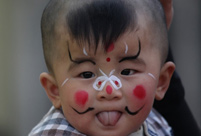 'Model husband' shatters image of love
'Model husband' shatters image of love
 Can animals smile? Or put on a happy face
Can animals smile? Or put on a happy face
 Geng Xuan crowned at 9th China Super Model Contest
Geng Xuan crowned at 9th China Super Model Contest
 Top 10 billionaires in the liquor industry
Top 10 billionaires in the liquor industry
 Backstage at China Fashion Week
Backstage at China Fashion Week
 Ballerinas anywhere but onstage
Ballerinas anywhere but onstage
 Top 10 safest airlines in the world
Top 10 safest airlines in the world
 Posters of 33rd HK Film Awards unveiled
Posters of 33rd HK Film Awards unveiled
 Top 10 most popular instant messaging apps in the world
Top 10 most popular instant messaging apps in the world
 Inspiring shadow images of Chinese army
Inspiring shadow images of Chinese army
 |
| Wen Zhang and Ma Yili. (Xinhua Photo) |
When Xu's company conducted a survey about attitudes toward infidelity, the results showed that 80 percent of women would opt for a divorce if they discovered that their partner had been unfaithful. The remaining 20 percent said they would try to keep the marriage going because of economic pressures, their children or psychological dependence. However, when men were asked the same question, 99 percent immediately chose divorce.
Wang Jun, manager of the Beijing Weiqing Marriage Consultancy, said that although cheating undoubtedly plays a part in the breakdown of a marriage, the impact of an accumulation of problems in people's daily lives should not be underestimated.
"People have always considered marriage to be a guarantee of loyalty, so instead of spending time with their spouse, they place greater emphasis on work and other factors," she said. "Neglecting a partner's needs can lead to a vicious circle and result in a lack of communication. In the most extreme cases, people become paranoid about their spouses and worry that they will have an affair. When distrust enters a previously harmonious relationship, the effect can be devastating."
"Family problems are the fundamental causes of many other social problems. This not only affects the lives, work and families of those who divorce, but can also affect their children's concept of love and life," she added.
'Troubleshooters'
Measures are being considered to tackle China's rapidly rising divorce rate, according to the Department of Social Affairs at the Ministry of Civil Affairs. In an interview conducted on March 30, Zhang Shifeng, the head of the department, said the measures under consideration include improved counseling services.
In 2013, approximately 164,000 couples married in Beijing, but 55,000 couples divorced, and the capital experienced a 65 percent rise in divorce between 2011 and 2013, according to the Beijing Marriage Registration Office. Other major cities such as Shanghai and Tianjin have experienced similar trends.
Ge Dongsheng, deputy director of the office, said that earlier this year the authorities launched a program that involved inviting trained mediators to tackle marital problems. "The 'troubleshooters' will try to help couples that still love each other, but have irrationally decided to divorce," he said.
Unlike Western countries, where the marriage ceremony usually involves taking vows based on religious practice, most Chinese couples simply sign a registration form and then hold a lavish celebratory banquet. To promote stronger awareness of marital responsibility, all of Beijing's registration offices will soon provide couples with the option of making voluntary marriage vows before they register.
In January, the marriage registration office in Beijing's Fangshan district started to provide voluntary premarital education classes designed to teach newlyweds the skills to promote better communications, along with tips on resolving the daily conflicts that are inevitable in a marriage.
"We invited along a couple who had been married for nearly two decades to address the young people. They described their experiences, explained how they resolve their disputes and also gave tips on preserving a harmonious relationship. The details they provided were invaluable," said Jin Mingxian, the director of the registration office.


 Wonderful moment of China's airborne forces
Wonderful moment of China's airborne forces Bai Baihe shoots for fashion magazine
Bai Baihe shoots for fashion magazine Red terraced fields in Dongchuan of Yunnan
Red terraced fields in Dongchuan of Yunnan Jiaju Tibetan Village
Jiaju Tibetan Village Spring dating
Spring dating Confucius institute at UC Davis
Confucius institute at UC Davis Little painted faces at temple fair
Little painted faces at temple fair Top 10 safest airlines in the world
Top 10 safest airlines in the world Foreign students at China-Myanmar border
Foreign students at China-Myanmar border The backstage of the Fashion Week
The backstage of the Fashion Week College students in Han costumes
College students in Han costumes Postgraduate works as waitress
Postgraduate works as waitress Life in a Lahu village in Yunnan
Life in a Lahu village in Yunnan An orphan’s wedding
An orphan’s wedding Hollywood documentary brings Diaoyu Islands truth to new audience
Hollywood documentary brings Diaoyu Islands truth to new audienceDay|Week|Month